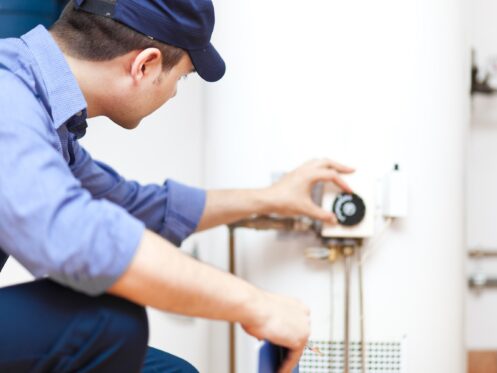Most of us give little thought to our water heaters, though we rely on them every day. Hot water is essential for warm showers, laundry, and washing dishes. Have you ever wondered how your water heater works?
At Midstate Plumbing & Air in Bridgeport, WV, we believe our customers should know the basics of how their plumbing components work. Knowing how your water heater operates can help you spot potential problems before they escalate. Understanding the different water heater types and how they work can help you make informed decisions.
The Basic Principles of Water Heaters
At their core, all water heaters perform the same service. They heat cold water and deliver it to your faucets and appliances when needed. However, water heaters differ in how they heat water and where they store it.
There are two main types of water heaters: tank and tankless. Although both serve the same purpose of providing hot water, they have very different designs and operations.
Traditional Tank Water Heaters
When we think about water heaters, most people think of the traditional tank version. These systems feature large, round tanks that hold 30 to 80 gallons of water. Traditional tank water heaters heat the stored water 24/7.
Cold water enters through a dip tube situated at the top of the tank. A gas burner or heating element at the bottom of the tank heats the water. As the water heats, it rises to the top of the tank, exiting the outlet pipe when you turn on a tap.
Tank water heaters feature a thermostat that monitors the water temperature and tells the burner when to heat. The tank is insulated to help keep the water hot while it is stored.
Traditional water heaters experience standby heat loss, causing them to reheat continuously, even when unused. Tank water heaters waste energy compared to tankless versions.
Tankless Water Heaters
We often call tankless systems on-demand water heaters. Instead of storing water in a tank, they heat on-demand as cold water flows through the unit. In addition to their efficiency, tankless water heaters also offer the advantage of taking up much less room.
When you turn on the tap, cold water enters the tankless water heater. Using electricity or gas, the heat exchanger heats the water as it passes through. The unit delivers hot water to your tap without needing a storage tank. They’re efficient because they don’t need to constantly keep a tank of water warm and ready for use. You get hot water on demand. The downside to this design is that if several people are using hot water at once, the system might not be able to keep up with a high enough flow rate.
Key Water Heater Parts
Several key parts allow water heaters to work safely and effectively. Understanding the parts and what they do can help ensure your water heater works effectively.
- Dip tube (Only in tank)
- Anode rod (Only in tank)
- Insulated storage tank (Only in tank)
- Pressure relief valve (Found on both)
- Thermostat (Found on both)
- Heating element or burner (Found on both)
- Control boards or sensor systems (Found on both)
- Venting system (Required for gas versions of both types)
Gas vs. Electric Water Heaters
Your choice between gas and electric will depend on your home’s existing setup. Each type has pros and cons.
Gas Water Heaters
Gas water heaters heat water much faster than electric models. If you have access to natural gas lines, tankless heaters may cost less to operate than electric models. The main drawback of gas water heaters is that they require proper venting to remove combustion gases.
Electric Water Heaters
Electric water heaters are typically less expensive to install and maintain. However, they are more expensive to operate and heat water at a slower rate.
We can help you determine which water heater will work most effectively for your home. Our plumbers will consider fuel availability, installation space, hot water usage, and your budget.
Comparing Water Heater Lifespans
Traditional tank water heaters usually last 8 to 12 years, while tankless models can last up to 20. Your water heater’s lifespan will depend on the type, maintenance schedule, and water quality. Hard water found in Bridgeport can impact both types of water heaters.
We offer annual maintenance appointments for all types, makes, and models of water heaters. Professional maintenance appointments involving inspection, cleaning, and testing can help extend your water heater’s lifespan. We can discover minor issues during these appointments before they become more serious and expensive.
Professional Water Heater Services
Midstate Plumbing & Air is a full-service plumbing contractor and air conditioning company that installs, maintains, and repairs all water heaters. We offer a full 10-year company warranty on water heater installations. Our team also provides 24/7 emergency repair services when you need us most. Your satisfaction and comfort are our top priorities.
Call Midstate Plumbing & Air if you need water heater services in Bridgeport or the surrounding areas.
